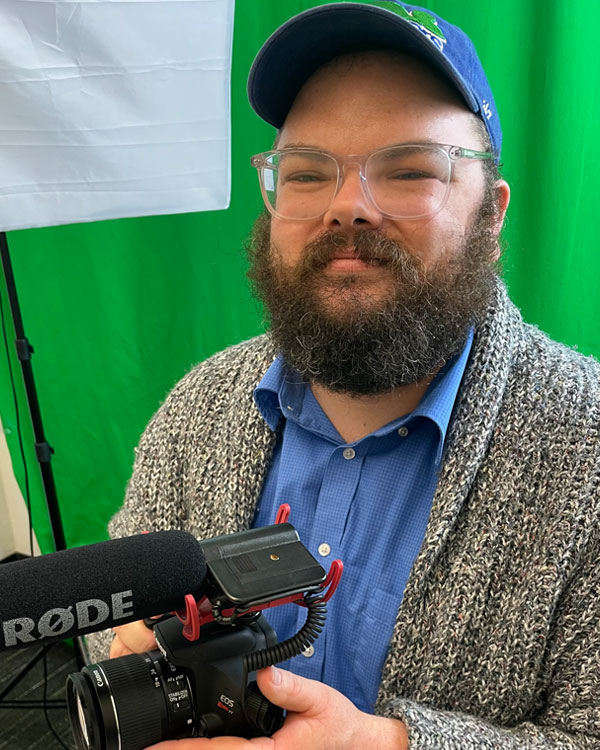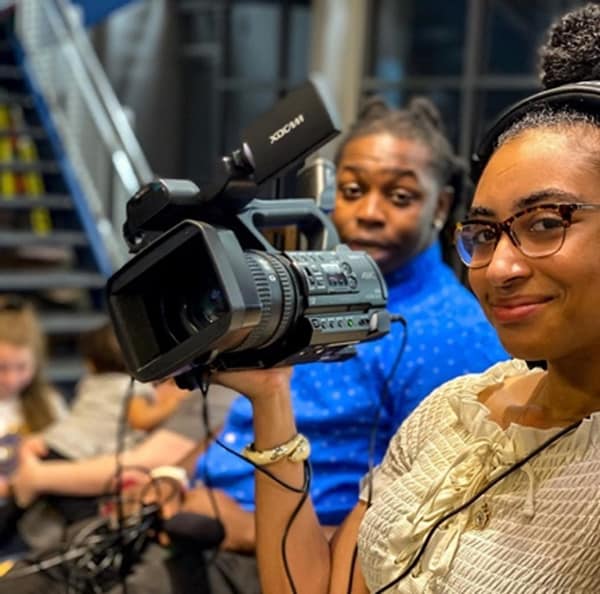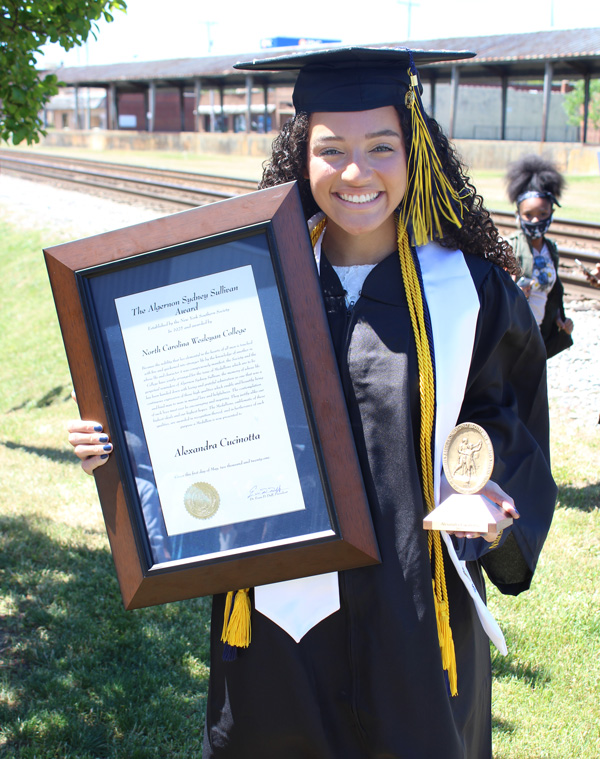Tomorrow’s brands depend on students that can communicate professionally and theoretically.
What You’ll Study
The Communication major at NCWU empowers students to become skilled, thoughtful communicators in a rapidly evolving media landscape. Through a multidisciplinary approach, students explore the theory and practice of communication across interpersonal, public, digital, and multimedia contexts. The program emphasizes critical thinking, creative problem-solving, public speaking, writing, and media production—skills that are highly valued in today’s job market.
NCWU offers concentrations in Cinema or Media Arts. Students can tailor their coursework to match personal interests and career goals, with opportunities to study journalism, public relations, digital media, and more. Faculty foster collaboration and inquiry, encouraging students to engage meaningfully with society and develop strategies for positive change. Communication graduates are prepared for careers in media, communications, public service, and beyond.
Learn More About NC Wesleyan's Programs
Faculty & Staff
Email any of our advisors with any questions you have about completing this program.
Jason Buel, Ph.D.
Associate Professor of Communications/Assistant Professor of Cinema & Media Arts, Program Coordinator, Communication

Jason Buel, Ph.D.

Tyana Ellis, Ph.D.
The Department of Communication invites students to pursue their specific interests by offering a variety of interdisciplinary elective options within the major. For example, students might choose to take a two-course sequence in marketing, a three-course sequence in journalism, or a two-course sequence in video production as part of their major. Students also have the option to fulfill major requirements with coursework on web authoring and publishing, the psychology of mass communication, writing for new media, multimedia writing, and more.
Graduates in Communication will leave NCWU trained to think deeply about how communication processes relate to many of today’s most important issues, which will serve them well in various professional contexts. Graduates will also understand that effective communication can bring people together across cultural contexts, including how to communicate with care and respect for others, providing them with essential asses in an ever connected world.
Here are some highlighted courses included in the Communication Major:
COM 200: Mass Communication
In this course, students study the characteristics and social significance of mass media, including video games, social media, television, film, radio, recorded music, books, newspapers, and more. Students will gain an understanding of media’s power to influence our thoughts and actions. The learning objectives for this course include: understanding the historical development of mass communication technologies, understanding how basic concepts of media law and ethics are applied, thinking critically about mass media as an integral part of culture, and analyzing the complex roles of media economics in shaping media production and consumption.
COM 215: Interpersonal Communication and Culture
This course introduces students to the study of interpersonal communication and culture by developing our understanding of communicative processes and practices that occur between people in face to face interactions. Students will gain an understanding of how whenever we communicate, we mean so much more than the literal words we say, and that our competency to communicate is at least in part due to our socialization in our culture. Learning objectives include being able to identify various dimensions of communication, how to analyze communication, and being able to connect communication to social structures.
COM 495: Special Topics: Environmental Communication
This course provides students with an opportunity to investigate how communication plays a fundamental role in our perceptions of place, nature, and the environment. Students will explore a variety of essays and media to analyze how we talk about the natural world including how environmental issues are communicated. Learning objectives include being able to think critically about how communication mediates the relationship between people and places, how we come to know “places,” “nature,” and our environment through what we say, and how issues related to place, nature, and the environment have been communicated to various publics.
COM 400: Documentary and Social Change
This course examines the documentary tradition in film, television, and new media. Throughout the semester, we will analyze the various elements that contribute to the creation of informative, moving, and powerful works of documentary media. We will examine a range of techniques and modes of representation that documentarians use to effectively communicate their ideas through audiovisual forms. We will learn about ethical issues involved in using nonfiction media to promote social change, and we will consider how technological developments over time have led to new ethical questions. Students will also produce their own short documentaries in order to put what they have learned into practice. The class includes readings, screenings, short writing assignments, and the production of a short video. Learning objectives include: understanding how the documentary impulse has manifested itself across media and throughout history; evaluating the effectiveness of past attempts to spark social change through documentary; analyzing documentary texts via their modes of representing historical reality, their strategies for developing effective arguments, and the variety of experiences they offer audiences; and analyzing how different perspectives, production methods, and rhetorical constraints shape documentary expressions of the “real world.”
COM 495: Special Topics: Communication and Social Movements
Social movements exist within conditions that are particularly inhospitable for effective communication. Movements often seek to persuade people to adopt views that are unpopular—if the things a movement called for were already popular, the movement wouldn’t need to exist. Most movements work with a fraction of the resources available to proponents of the status quo: they often rely on volunteer labor to coordinate their messaging, and they lack institutional access to traditional broadcast media to amplify their messaging. They may even become targets of violence. How, then, do movements communicate effectively? To answer that question, we will consider interpersonal communication between community organizers, public speech that attempts to move people to action, mass media narratives in which movement organizers try to make their voices heard, and new media that provides new challenges and opportunities for movements. The course will focus primarily on movements in the US over the last decade, though some older cases and some movements from elsewhere will also be examined to help contextualize more recent developments.
What are the courses like in Communication at NCWU?
Check out our latest university catalog for learning goals, course descriptions and suggested plans of study for NC Wesleyan University’s Communication Program.
Major Programs in Communication
The multidisciplinary program in communication provides theory, tools and techniques for analyzing and producing works of communication in many arenas of professional and personal interaction.
Minor In Communication
A minor is not required for graduation. Those students, however, who wish to complement their major course of study with a second area of inquiry may choose a minor field. At least nine semester hours of the minor must be taken at North Carolina Wesleyan University.
How does this degree prepare students for a career?
One of the defining features of the discipline of Communication is that it has many areas of specialization. That means a major in Communication can often be tailored to a student’s interests, strengths, and ambitions. To learn more about the areas of specialization within our discipline, visit the National Communication Association website.
Communication Major Career Paths:
A degree in communication prepares students for careers in a wide range of industries. Here are just a few examples of the kinds of jobs that communication majors pursue after college:
- Project Coordinator
- Event Planner
- Program Facilitator
- Communication Specialist
- Chief Communications Officer
- Public Relations Specialist
- Social Media Director
- Digital Media Strategy Lead
- Publicist
- Brand Manager
- Marketing Operations & Strategy Analyst
- Director of Marketing & Private Events
- News Editor
- News Bureau and Community Engagement Manager
- Technical Account Manager
- Director of Client Services
- Regulatory Communications Coordinator
- Media Assistant
- Producer
The ability to communicate effectively is one of the most highly sought skills by employers. A recent survey by the National Association of Colleges and Employers found that the knowledge and skills taught in Communication courses are essential to being hired, regardless of one’s major.
Wondering what you can do with a degree from NCWU’s Communication major? Check out these resources from NCWU Career Development & Leadership and the Occupational Information Network (O*NET).
Wesleyan is dedicated to assisting students in their professional development offering resources and guidance for hands-on learning experiences through internships, assignments within the courses and job search resources. Let us help you focus on your education and career at the same time!
 Communication majors are encouraged to complete an internship as part of their study. Some Communication majors choose to intern at WHIG-TV, a local television station housed right here on campus. Past students have interned with WUNC and PBS NC.
Communication majors are encouraged to complete an internship as part of their study. Some Communication majors choose to intern at WHIG-TV, a local television station housed right here on campus. Past students have interned with WUNC and PBS NC.
Students interested in media production or broadcasting are often involved with BGA News, our campus news program, where they develop original reporting on the issues that matter most to them.
If you are wondering if Communication is a good fit for you, you may want to explore the websites of some of the following professional organizations: the National Communication Association, the International Communication Association, the Society for Cinema and Media Studies, the Public Relations Society of America, and the Popular Culture Association.
For more information contact:
Dr. Jason Buel
Program Coordinator
jbuel@ncwu.edu
Cinema & Media Arts Concentration
Gain experience in video production, broadcast production, and broadcast and multimedia journalism.
The Cinema & Media Arts concentration at NC Wesleyan emphasizes the art of storytelling as the foundation for creating visual media. Students develop their skills in writing, producing, directing, cinematography, sound design, and editing. They learn from faculty and professionals who are specialists in their fields.
While they develop as creative professionals, students produce portfolios demonstrating areas of specialization as well as a broad skill set suitable for the ever-changing media landscape. This is a major that also can be helpful to students interested in video production, broadcast production, and broadcast and multimedia journalism.
Learning Outcomes:
- The art of storytelling as the foundation for creating visual media
- Develop skills in writing, producing, directing, cinematography, sound design and editing.
- Learn from faculty and professionals who are specialists in their fields
- Produce portfolios demonstrating areas of specialization as well as a broad skill set suitable for the ever-changing media landscape
- Helpful to students interested in video production, broadcast production, and broadcast and multimedia journalism.

Career Paths for Cinema & Media Arts Majors
Cinema and Media majors embark on a dynamic journey that unfolds a myriad of career paths in the rapidly evolving world of entertainment and communication. Graduates often venture into filmmaking, working as directors, producers, cinematographers, or editors, contributing to the creation of compelling visual narratives in film and television. Opportunities in scriptwriting allow them to shape captivating stories, while roles in film and media criticism involve analyzing and interpreting the cultural impact of visual content. Careers in digital media production, including web series and online content creation, have become increasingly prominent.
Graduates may find their niche in media planning, advertising, and marketing, leveraging their understanding of visual communication to promote brands and content. With the rise of streaming platforms and digital content consumption, there are also roles in content distribution and digital strategy. The versatile skill set acquired in a Cinema and Media major opens doors to diverse professions, reflecting the multifaceted nature of the entertainment and media industry.
Career Areas:
- Director (Film/Television/Video)
- Producer (Film/Television/Video)
- Production Assistant
- Video Editor/Videographer
- Camera Operator
- Location Manager
- Script Supervisor
- Press Agent/Media Relations Specialist
- Social Media Manager
- Public Relations Officer
Wondering what you can do with a degree from NCWU’s Entertainment Arts major? Check out these resources from NCWU Career Development & Leadership and the Occupational Information Network (O*NET).
Wesleyan is dedicated to assisting students in their professional development offering resources and guidance for hands-on learning experiences through internships, assignments within the courses and job search resources. Let us help you focus on your education and career at the same time!
Don’t take our word for it... Our students speak for themselves!

24/7 Tutoring Services. Free & Easy.
North Carolina Wesleyan University is partnered with Brainfuse, a complimentary online tutoring service, provided to all Wesleyan students. This service is available 24 hours a day, seven days a week and features live tutoring in the subjects of writing, reading, math, computer and technology, science and business.
Student Organizations
Be engaged at NCWU!
Choose from 30+ student-led clubs and organizations to connect with other students who share your academic interests or… create your own.
Transfer Articulation Agreements
To simplify the transfer process, NC Wesleyan University has a number of partnerships with other community colleges, universities and institutions that allow students to enroll at NCWU with simple pathways. These agreements outline the courses you should take to prepare for transferring to NCWU. Review the full list of transfer articulation agreements to see if your institution is listed.




